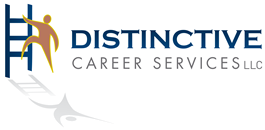
As a job seeker aiming to capture an employer’s attention, knowing the “right” skills to put on your resume is pivotal. But how do you know which resume skills to include? And, once you’ve decided on which skills to include, what is the right way to incorporate them into your resume?
We get it. Writing your resume can feel like trying to solve a puzzle with a million pieces.
Worry no more!
This no-nonsense article will walk you through curating the perfect blend of resume skills tailored to your industry and position. We’ll help you navigate the ins and outs of creating a resume that’s not just a list of jobs and skills, but a true reflection of what you bring to the table. Even better, we’ll show you how you can craft an ATS-optimized resume that showcases your abilities effectively, giving you a competitive edge in today’s job market.
Read on for our expert resume tips, real-world examples, and customizable skills-based resume templates that make creating your resume a breeze.
Key Takeaways
- Analyzing job descriptions and aligning your resume with the required skills and keywords can improve your chances of your resume performing well in keyword searches of applicant tracking systems, as well as attracting hiring managers’ attention.
- It’s important to showcase a balance of hard and transferable technical skills specific to your industry, as well as general skills like problem-solving and critical thinking.
- Soft skills like communication, teamwork, time management skills, and adaptability are invaluable across professions and should be clearly highlighted with examples in your resume.
Decoding the Job Description: Identifying Must-Have Skills
Do you want to discover what employers are looking for in an ideal candidate?
The job description holds the answers. By analyzing announcements of job openings, you can glean information about the technical capabilities, soft skills, and cultural preferences that companies value. Even if you are just in the planning stages and not actively job searching, analyzing the job descriptions of openings that appeal to you will give you invaluable information. The question is, how can you incorporate these insights into your resume? The answer is all in the way you express yourself.
Yes, the way you articulate your skills can make all the difference. By echoing the exact language and keywords found in the job description, you increase your chances of capturing the attention of hiring managers. This alignment between your resume and the job description shows your readiness for the role and can put you ahead in the selection process.
However, do NOT simply copy and paste the job description onto your resume. Instead, modify your resume content and current skill keywords to align with those in the job description. This strategic adjustment not only underlines your suitability for the role but also highlights your expertise.
Crafting Your Skills Arsenal: Hard Skills That Make You Marketable
As you delve into the job requirements, you’ll likely encounter a list of desired technical abilities, also known as hard skills. These job skills are often industry-specific and are the defining abilities that set professionals apart in specialized roles. Identifying the right skills to put on resume job descriptions can significantly enhance your chances of catching a potential employer’s attention.
A strong repertoire of hard skills, be it proficiency in a programming language, mastery of financial accounting, or expertise in data analysis, can greatly enhance your resume. As these skills are often learned through formal education or on-the-job training, they provide tangible evidence of your technical proficiency and can be a deciding factor in landing your dream job.
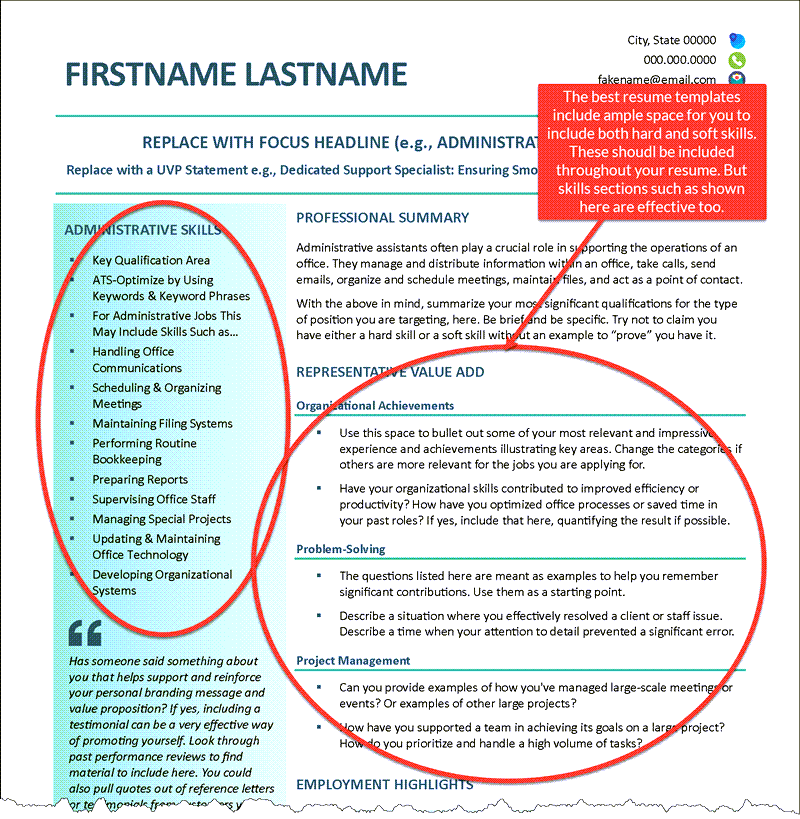
Transferable Technical Skills: More Than Just Computers
Because hard skills are often referred to as technical skills, many job seekers become confused. Although computer proficiency is one common type of technical skill, the phrase refers to more thank just computer skills, it refers to specialized skills for various professions and industries.
Transferable technical skills are specialized abilities you can apply in many different jobs or industries. They’re especially valuable because they can help you transition between fields or advance in your career, even if you’re moving into a role that seems quite different from your previous positions.
Here are some examples of transferable hard skills that are highly valued across various sectors:
These skills not only make your resume more attractive to potential employers but also equip you with the versatility needed to adapt to the rapidly changing job market. Highlighting these transferable hard skills on your resume, especially when you can demonstrate how you’ve used them to achieve results, can significantly boost your employability across a wide range of industries.
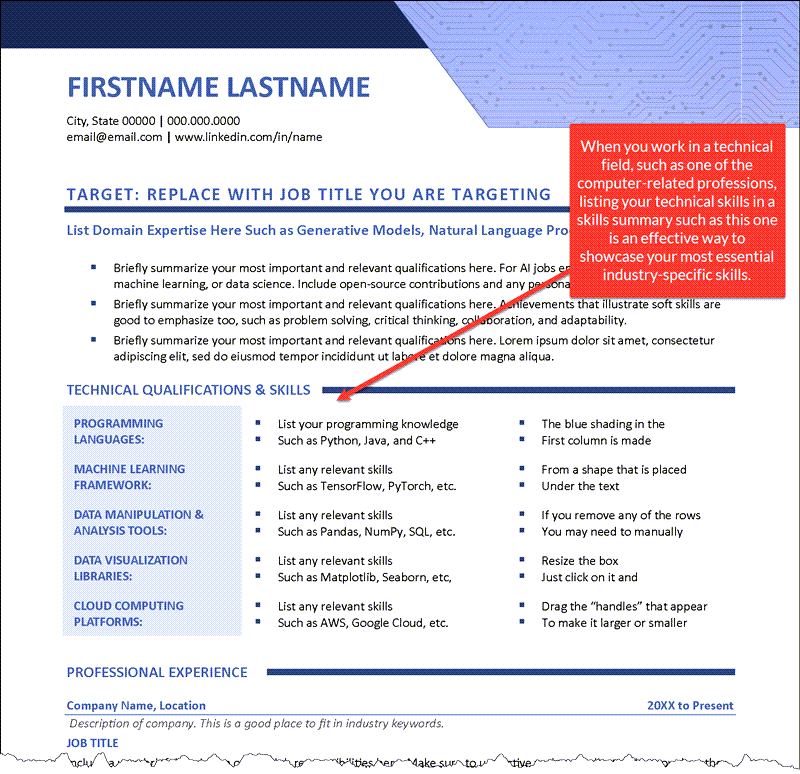
Tailoring Your Toolkit: Industry & Profession-Specific Hard Skills Breakdown
Diving into your skill set, it’s crucial to understand that various industries value different capabilities.
In the following sections, we’ll explore the essential skills required by different sectors. These are just examples for common sectors. If you work in a different sector, use these as examples to guide you in developing a list specific to the types of jobs for which you will be applying. This knowledge will assist you in tailoring your resume for particular job applications, enabling you to stand out from other applicants.
Computers & IT
In the fast-paced world of Computers & IT, having an up-to-date, comprehensive skill set can distinguish you from others. The computer and IT industries are vast and constantly evolving, making certain hard skills particularly valuable, but also constantly evolving. Here are some computer and information technology hard skills to consider including on your resume, if relevant:
Coding and Programming
- Languages: Proficiency in programming languages such as Python, Java, C++, and JavaScript is fundamental. These languages are the backbone of software development, web development, and mobile app development.
- Frameworks: Knowledge of frameworks like React, Angular, Node.js, and Django can significantly enhance development efficiency and are highly sought after in the industry.
Cloud Computing
- Platforms: Familiarity with leading cloud service platforms like Amazon Web Services (AWS), Microsoft Azure, and Google Cloud Platform (GCP) is crucial for deploying and managing applications in the cloud.
- Architecture and Services: Understanding cloud architecture (IaaS, PaaS, SaaS) and services such as cloud storage, serverless computing, and cloud security is essential.
Database Management
- SQL and NoSQL Databases: Skills in managing SQL databases (e.g., MySQL, PostgreSQL) and NoSQL databases (e.g., MongoDB, Cassandra) are important for handling data efficiently.
- Data Modeling and Query Optimization: Ability to design database schemas and optimize queries for performance are key competencies.
Cybersecurity
- Network Security: Knowledge of securing network infrastructures, including firewalls, VPNs, and intrusion detection systems.
- Cryptography: Understanding cryptographic principles and their application in securing data transmission and storage.
- Risk Assessment and Mitigation: Ability to identify vulnerabilities and implement strategies to mitigate risks.
Software Development Practices
- Version Control: Proficiency in using version control systems like Git to manage code changes and collaborate with other developers.
- Agile and DevOps Practices: Familiarity with Agile methodologies and DevOps practices, including continuous integration and continuous deployment (CI/CD), to enhance collaboration and streamline development processes.
User Interface / User Experience (UI/UX) Design
- Design Tools: Skills in using design and prototyping tools like Adobe XD, Sketch, and Figma.
- User-Centered Design: Understanding of principles related to creating intuitive and user-friendly interfaces.
Data Analysis and Machine Learning
- Data Visualization Tools: Proficiency in tools like Tableau, Power BI, or Python libraries (e.g., Matplotlib, Seaborn) for visualizing data insights.
- Machine Learning Frameworks: Knowledge of machine learning libraries and frameworks such as TensorFlow, PyTorch, and Scikit-learn for building predictive models.
Engineering
For those in engineering, exhibiting a distinct set of skills can pave the way to success. Whether you’re a civil, mechanical, electrical, or software engineer, your resume should reflect your technical proficiency, problem-solving skills, and ability to work effectively in teams. However, engineering is a broad field encompassing various disciplines, each with its specific set of required hard skills. Here are some to consider including in your resume, if relevant.
Mechanical Engineering
- CAD Software: Proficiency in computer-aided design (CAD) software such as AutoCAD, SolidWorks, or CATIA for designing and modeling mechanical components.
- Thermodynamics and Fluid Mechanics: Understanding the principles of thermodynamics and fluid mechanics to analyze and design systems like HVAC, engines, and turbines.
- Manufacturing Processes: Knowledge of manufacturing processes, including machining, welding, and 3D printing, for the production of mechanical parts.
Electrical Engineering
- Circuit Design and Analysis: Skills in designing and analyzing electrical circuits using tools like SPICE, OrCAD, and Altium Designer.
- Microcontroller Programming: Proficiency in programming microcontrollers (e.g., Arduino, Raspberry Pi) for developing embedded systems.
- Power Systems: Understanding of power generation, transmission, and distribution systems, including renewable energy technologies.
Civil Engineering
- Structural Analysis Software: Proficiency in structural analysis software such as STAAD.Pro, SAP2000, or Revit for designing and analyzing structures.
- Surveying: Knowledge of surveying techniques and tools for measuring and mapping land features.
- Construction Project Management: Skills in project management methodologies and tools (e.g., Microsoft Project, Primavera) for overseeing construction projects.
Software Engineering
- Programming Languages: Proficiency in programming languages such as Java, Python, C++, and SQL for software development.
- Software Development Life Cycle (SDLC): Understanding of SDLC models (e.g., Agile, Scrum, Waterfall) for managing and streamlining the software development process.
- Version Control Systems: Skills in using version control systems like Git to manage code changes and collaborate with other developers.
Chemical Engineering
- Process Simulation Software: Proficiency in process simulation software like Aspen Plus or HYSYS for designing and optimizing chemical processes.
- Chemical Reaction Engineering: Understanding of chemical reaction kinetics and reactor design for developing efficient chemical manufacturing processes.
- Safety and Environmental Regulations: Knowledge of safety practices and environmental regulations relevant to chemical processing and manufacturing.
Environmental Engineering
- GIS Software: Skills in Geographic Information System (GIS) software like ArcGIS for analyzing and managing environmental data.
- Water and Wastewater Treatment: Understanding of water and wastewater treatment processes and technologies for designing treatment systems.
- Environmental Impact Assessment: Ability to conduct environmental impact assessments (EIA) to evaluate the potential environmental effects of projects.
Aerospace Engineering
- Aerodynamics: Knowledge of aerodynamics principles for designing aircraft and spacecraft.
- Flight Simulation Software: Proficiency in flight simulation software for testing and validating aircraft designs.
- Systems Engineering: Skills in systems engineering for integrating complex aerospace systems and ensuring their reliability and efficiency.
These hard skills are critical for success in the respective engineering disciplines. Highlighting relevant skills on your resume, along with examples of projects or experiences where you’ve applied these skills, can significantly enhance your attractiveness to potential employers in the engineering field.
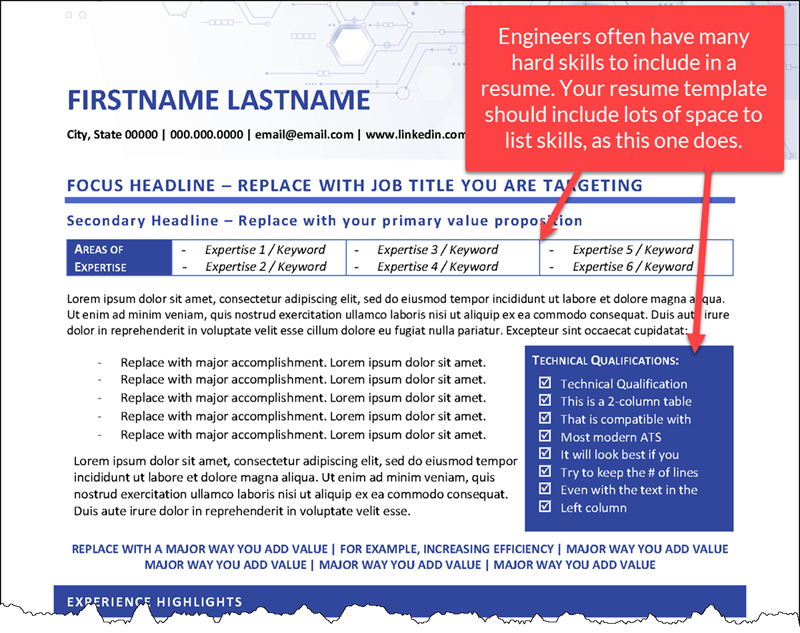
Healthcare
The healthcare industry is diverse, encompassing a range of roles from clinical care to healthcare administration and technology. Below is a list of hard skills that are highly valued across various segments of the healthcare sector.
Clinical Skills
- Patient Assessment: Ability to conduct thorough and accurate patient assessments to determine care needs, including physical examinations and health history evaluations.
- Medical Procedures: Proficiency in performing specific medical procedures, such as venipuncture, injections, catheterization, and wound care, depending on the role.
- Life Support Certifications: Certifications in Basic Life Support (BLS), Advanced Cardiovascular Life Support (ACLS), and Pediatric Advanced Life Support (PALS), essential for many healthcare professionals.
Nursing Skills
- Patient Care: Skills in providing comprehensive nursing care, including medication administration, patient education, and monitoring for changes in patient condition.
- Specialized Care: Knowledge in specialized areas such as critical care, emergency nursing, pediatrics, or oncology, depending on the nurse’s focus.
- Electronic Health Record (EHR) Systems: Proficiency in using EHR systems like Epic, Cerner, or Meditech for documenting patient care.
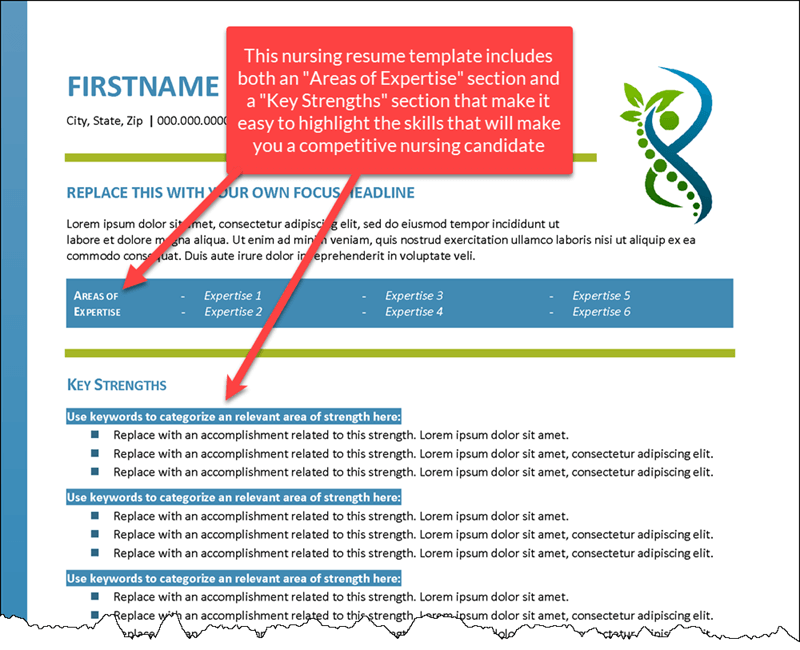
Medical Specialties
- Diagnostic Imaging: Skills in operating and interpreting diagnostic imaging equipment, such as X-rays, MRIs, and CT scans, for radiologists and radiologic technologists.
- Surgical Techniques: For surgeons and surgical technologists, proficiency in specific surgical techniques and understanding of surgical instruments and procedures.
- Laboratory Testing: Skills in conducting and analyzing laboratory tests for medical laboratory technicians and technologists, including blood tests, cultures, and microscopic examinations.
Healthcare Information Technology (IT)
- Health Informatics: Understanding of health informatics principles to improve patient care through technology, including data analysis and management.
- Cybersecurity in Healthcare: Knowledge of cybersecurity practices to protect sensitive patient data against breaches and comply with healthcare regulations like HIPAA.
- Telehealth Technologies: Skills in utilizing telehealth platforms and technologies to provide remote patient care and consultations.
Healthcare Administration
- Medical Billing and Coding: Proficiency in medical billing and coding systems, including ICD-10, CPT, and HCPCS, for accurate patient billing and insurance claims processing.
- Healthcare Compliance: Knowledge of healthcare laws and regulations, including HIPAA, to ensure compliance in clinical and administrative practices.
- Healthcare Management Systems: Skills in using healthcare management software for scheduling, patient records management, and operational efficiency.
These hard skills are crucial for professionals seeking to advance or enter the healthcare industry. Tailoring your resume to highlight these skills, along with relevant certifications and experiences, can significantly improve your job prospects in this vital and rewarding field.
Finance
The finance industry demands a blend of analytical, technical, and regulatory knowledge. Below is a list of hard skills that are highly valued across various finance roles.
Financial Analysis
- Financial Modeling: Proficiency in building models to forecast the financial performance of companies, using tools like Excel or specialized software such as MATLAB.
- Budgeting and Forecasting: Skills in creating detailed budgets and forecasts to guide business planning and decision-making.
- Variance Analysis: Ability to compare projected financial outcomes to actual results, identifying and analyzing the reasons for variances.
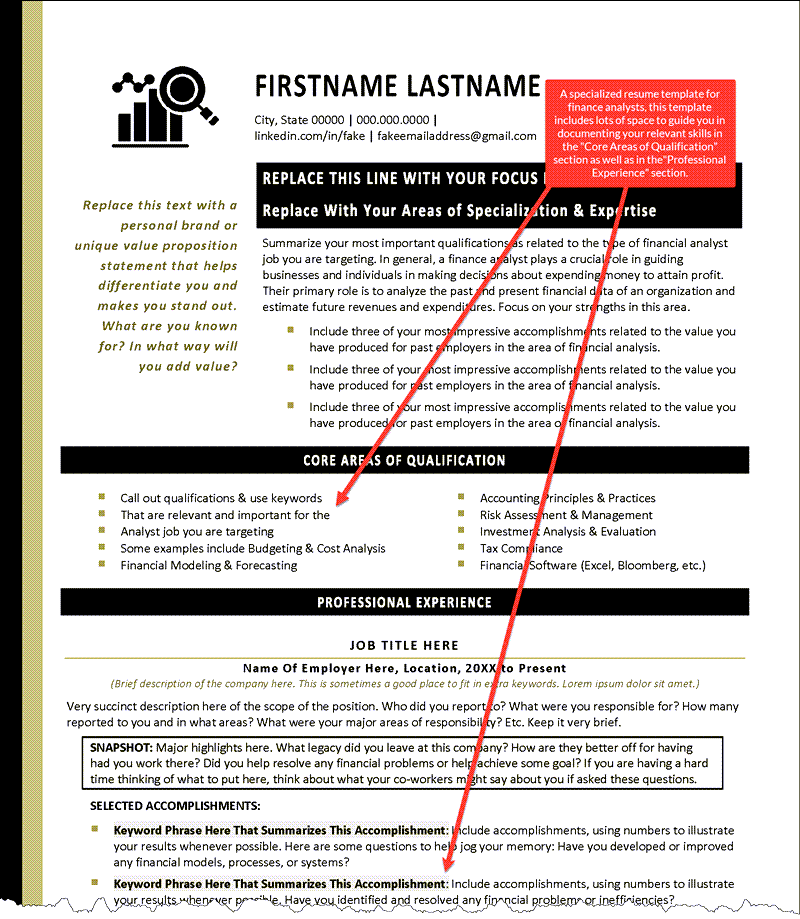
Accounting
- Accounting Principles: Deep understanding of Generally Accepted Accounting Principles (GAAP) or International Financial Reporting Standards (IFRS).
- Bookkeeping: Skills in maintaining accurate financial records, including ledgers, journals, invoices, and receipts.
- Tax Preparation: Knowledge of tax codes and regulations, capable of preparing and filing tax returns for individuals or businesses.
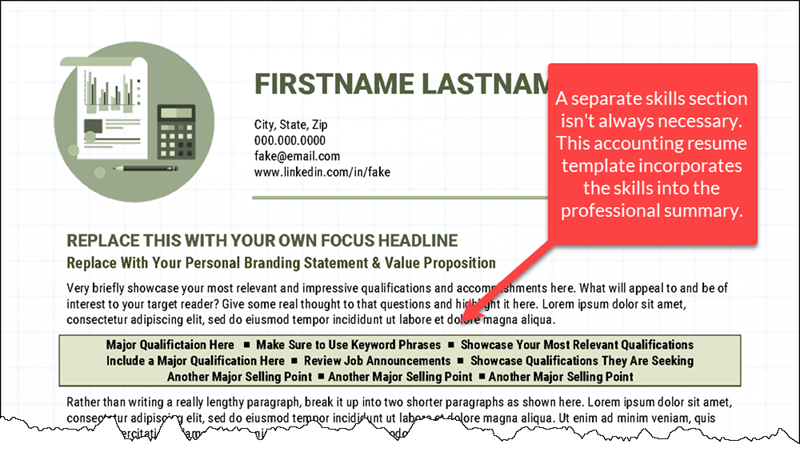
Investment Banking
- Deal Structuring: Understanding of how to structure various types of financial deals, including mergers, acquisitions, and equity offerings.
- Market Analysis: Ability to analyze market trends and economic conditions to inform investment strategies and client recommendations.
- Regulatory Compliance: Familiarity with financial regulations and ensuring compliance in all transactions and advisory services.
Financial Planning and Advisory
- Wealth Management: Skills in managing clients’ wealth, including investment strategies, estate planning, and tax planning.
- Retirement Planning: Ability to create comprehensive retirement plans, considering factors like savings, investments, and Social Security.
- Risk Management: Understanding of how to identify, assess, and mitigate financial risks for individuals and organizations.
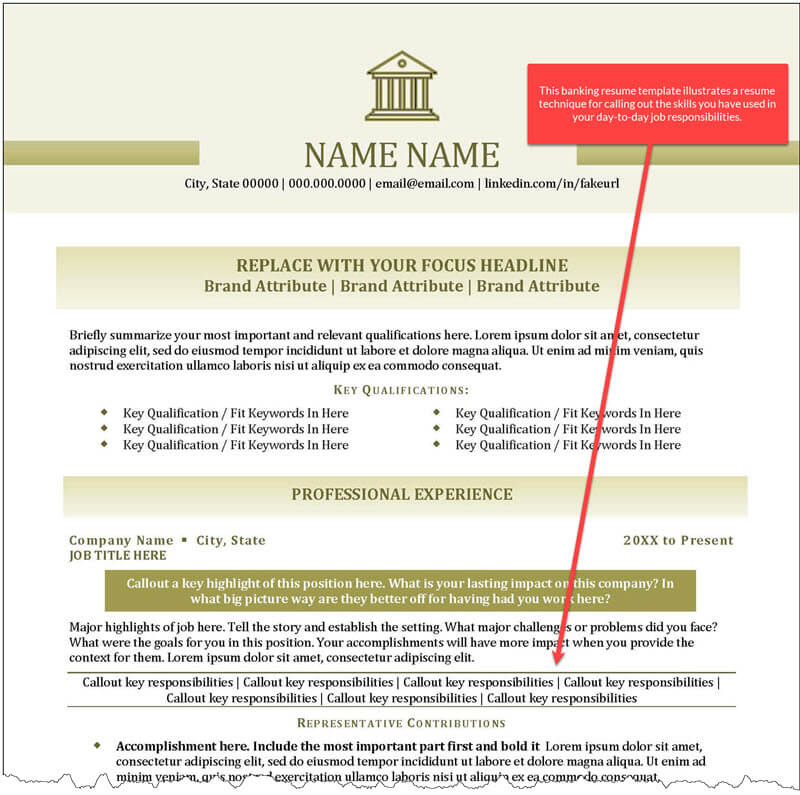
Banking and Credit Analysis
- Credit Risk Analysis: Skills in assessing the creditworthiness of borrowers, analyzing financial statements, and determining loan conditions.
- Loan Origination and Processing: Knowledge of the loan origination process, from application to funding, including underwriting standards and procedures.
- Interest Rate Structuring: Understanding of how to structure interest rates on loans and deposits to maintain bank profitability and competitiveness.
Financial Software and Systems
- Advanced Excel: Mastery of Excel for financial analysis, including complex formulas, pivot tables, and macros.
- Financial Reporting Software: Proficiency in financial reporting and consolidation software like SAP, Oracle Financials, or QuickBooks.
- Blockchain and Cryptocurrency: Understanding of blockchain technology and cryptocurrency markets, relevant for roles in fintech companies and investment firms focusing on digital assets.
Regulatory Knowledge
- Compliance: Knowledge of financial regulations, such as the Dodd-Frank Act, Sarbanes-Oxley Act, and Basel III, crucial for roles in compliance and regulatory affairs.
- Anti-Money Laundering (AML): Skills in implementing AML policies and procedures to prevent, detect, and report potentially suspicious activities.
- Securities Regulations: Understanding of securities laws and regulations, important for roles in securities trading, investment advisory, and financial analysis.
These hard skills are essential for navigating the complex and dynamic world of finance. Highlighting these skills on your resume, along with relevant experiences and certifications (such as CPA, CFA, or Series 7), can significantly enhance your attractiveness to potential employers in the finance industry.
Education
In the realm of Education, teaching skills are merely the beginning. Whether you’re a preschool teacher, high school teacher, college professor, or an education consultant, your resume should highlight your ability to engage students, create effective lesson plans, and evaluate student performance. Below is a list of other hard skills that are highly valued across various educational roles.
Teaching and Classroom Management
- Instructional Strategies: Mastery of various teaching methods and instructional strategies tailored to diverse learning styles and needs.
- Classroom Management: Ability to create and maintain a positive learning environment, managing classroom dynamics and student behavior effectively.
- Assessment and Evaluation: Skills in designing and implementing assessments to measure student learning and progress.
Curriculum Development
- Curriculum Design: Proficiency in developing curriculum plans that meet educational standards and cater to the needs of diverse student populations.
- Educational Standards: Knowledge of state, national, and international educational standards and how to integrate them into curriculum and lesson plans.
- Differentiated Instruction: Ability to adapt teaching methods and materials to accommodate students with varying levels of ability and learning styles.
Educational Technology
- Learning Management Systems (LMS): Proficiency in using LMS platforms like Canvas, Blackboard, or Moodle to deliver content and manage courses.
- Educational Software and Tools: Skills in integrating educational software and digital tools into the learning experience to enhance engagement and understanding.
- Digital Literacy: Understanding of digital literacy principles and the ability to teach and encourage safe and effective use of technology among students.
Special Education
- Individualized Education Plans (IEP): Ability to develop and implement IEPs for students with special needs, ensuring access to the general education curriculum.
- Behavioral Management Techniques: Skills in applying behavioral management techniques to support students with behavioral challenges.
- Assistive Technologies: Knowledge of assistive technologies and how they can support the learning of students with disabilities.
Educational Leadership and Administration
- Educational Policy: Understanding of educational policies and regulations at the local, state, and federal levels.
- School Finance and Budgeting: Skills in managing school finances, including budgeting, financial planning, and resource allocation.
- Staff Development and Training: Ability to plan and implement professional development programs for teachers and staff to enhance their skills and effectiveness.
Language and Literacy Education
- Reading Instruction: Mastery of techniques for teaching reading and literacy skills, including phonics, comprehension strategies, and fluency.
- English as a Second Language (ESL): Skills in teaching English to non-native speakers, understanding of language acquisition theories and methodologies.
- Literacy Assessment: Ability to assess literacy levels and design interventions to support reading and writing development.
STEM Education
- Science and Math Pedagogy: Proficiency in teaching strategies specific to science and mathematics, fostering inquiry and problem-solving skills.
- Technology Integration: Skills in integrating technology into STEM education to enhance learning and engagement in science, technology, engineering, and math.
- Project-Based Learning: Ability to design and implement project-based learning experiences that engage students in real-world problem-solving in STEM fields.
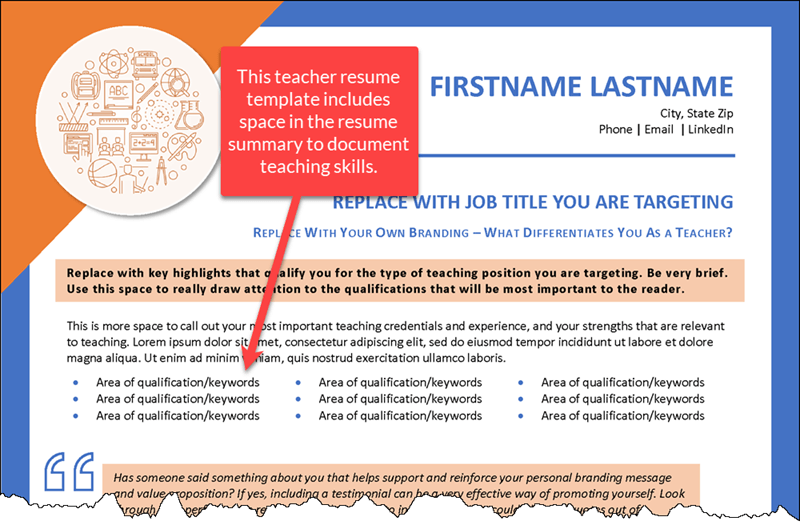
The Power of Soft Skills: Showcasing Interpersonal Strengths
While hard skills indicate your technical prowess, soft skills are crucial on a resume because they demonstrate your ability to interact effectively with others and adapt to the dynamic challenges of the workplace.
Here are the 15 most common and desirable soft skills that employers seek.
- 1Communication Skills: The ability to express thoughts and ideas clearly and effectively in both written and verbal forms.
- 2Critical Thinking: Employing sound judgment to evaluate and analyze issues to form decisions and solve problems.
- 3Leadership Skills: The capacity to inspire and guide individuals or teams towards achieving goals, including the ability to coach and develop others.
- 4Teamwork: Working effectively and cooperatively with others, contributing to team efforts, and understanding team dynamics.
- 5Professionalism: Exhibiting behaviors that are respectful, reliable, and responsible, reflecting a positive image of oneself and the organization.
- 6Equity and Inclusion: Demonstrating openness, inclusiveness, and the ability to interact respectfully with all people, appreciating individual differences.
- 7Technology: Being open to exploring new technologies, using technology to boost efficiency, and applying appropriate technology for tasks.
- 8Career and Self-Development: Proactively developing oneself and one’s career through continual personal awareness and networking.
- 9Emotional Intelligence: Recognizing and managing one’s emotions and understanding and influencing the emotions of others.
- 10Problem-Solving: The ability to identify problems and develop creative solutions efficiently.
- 11Adaptability: Adjusting to changing circumstances, learning new skills, and remaining relevant in the workplace.
- 12Time Management: Setting priorities, organizing tasks, and managing time effectively to meet deadlines.
- 13Positive Attitude: Maintaining an optimistic and constructive outlook, even in the face of challenges.
- 14Flexibility: Being flexible and adaptable, able to take on new challenges and learn new skills quickly.
- 15Interpersonal Skills: Building relationships easily and communicating effectively with others.
And here are 15 additional highly desired soft skills to put on your resume (if relevant).
- 1Resilience: The ability to bounce back from setbacks and maintain perseverance in the face of challenges.
- 2Critical Observation: Being able to notice and interpret details that might not be immediately obvious, leading to insightful conclusions.
- 3Conflict Resolution: The skill to mediate and resolve disputes effectively among individuals or groups.
- 4Creativity: The capacity to think outside the box and generate innovative solutions or ideas.
- 5Active Listening: Fully concentrating, understanding, responding, and then remembering what is being said.
- 6Decision Making: The ability to make informed and effective choices by analyzing information and considering the consequences.
- 7Empathy: Understanding and sharing the feelings of others, fostering stronger workplace relationships.
- 8Negotiation: Successfully navigating discussions to reach agreements that benefit all parties involved.
- 9Persuasiveness: The skill to convince others to understand, accept, and act upon your viewpoint.
- 10Self-awareness: Having a clear understanding of your personality, including strengths, weaknesses, thoughts, beliefs, motivation, and emotions.
- 11Strategic Thinking: The ability to analyze the current state and envision a better future, then plan how to get there.
- 12Cultural Competency: The ability to work effectively across cultural differences, crucial in today’s globalized business environment.
- 13Patience: The capacity to accept or tolerate delay, trouble, or suffering without getting angry or upset.
- 14Initiative: Taking action and steps forward without being prompted, demonstrating a self-starting attitude.
- 15Accountability: Accepting responsibility for your actions and their outcomes, a key component of trustworthiness and integrity in the workplace.
While it’s important to include soft skills on your resume, it’s equally crucial to back soft resume skills up with concrete examples rather than merely stating you possess them. Simply listing personal attributes like “good interpersonal skills” or “strong leadership” without context can come across as vague and clichéd.
Employers look for candidates who can demonstrate how they’ve applied these skills in real-world situations to achieve positive outcomes. For instance, instead of saying you have “excellent problem-solving skills,” describe a specific challenge you faced, the approach you took to address it, and the results of your actions.
This method not only provides evidence of your abilities but also helps you stand out from candidates who may rely on overused phrases and clichés. Remember, showing how you’ve effectively utilized your soft skills can make a more compelling case for your candidacy than simply telling.
The Art of Transferable Soft Skills
Transferable skills can provide a significant advantage, particularly if you’re contemplating a career transition or have some gaps in your employment history. These skills are competencies that can be applied in various job roles across different industries.
While some soft skills are more valued in some industries than others, many of them are transferable and highly valued across industries. Skills like leadership, organization, and creativity are universally transferable and highly valued in multiple professions. So, don’t hesitate to highlight these skills on your resume, even if your experience doesn’t perfectly align with the job description.
Integrating Skills into Your Resume
Having examined the different types of hard and soft skills, it’s time to discuss their incorporation into your resume. A well-crafted resume weaves a narrative that not only lists your soft and hard skills but also demonstrates how you’ve applied them in real-world situations.
Let’s examine this further by discussing how to create an engaging inventory of your skills in a dedicated section and narrate your experiences effectively.
The Skills Section: Creating a Compelling Inventory
A dedicated skills section on your resume can do wonders. It not only provides recruiters with a snapshot of your abilities but also improves your resume’s visibility in applicant tracking systems (ATS). While you have flexibility in how you place your resume skills section in the overall document, most commonly it is near the beginning as part of the resume summary. The placement of this section on your resume should complement your professional experience and highlight your skills.
To make the most of this resume skills section, tailor it to match the job description, beginning with the most relevant skills and prioritizing those mentioned in the job description by listing them first.
It’s also important to include a mix of important soft skills, as well as technical and workplace skills. This demonstrates your versatility and ability to thrive in various aspects of the job. To organize this section effectively, use bullet points or group skills by major job functions.
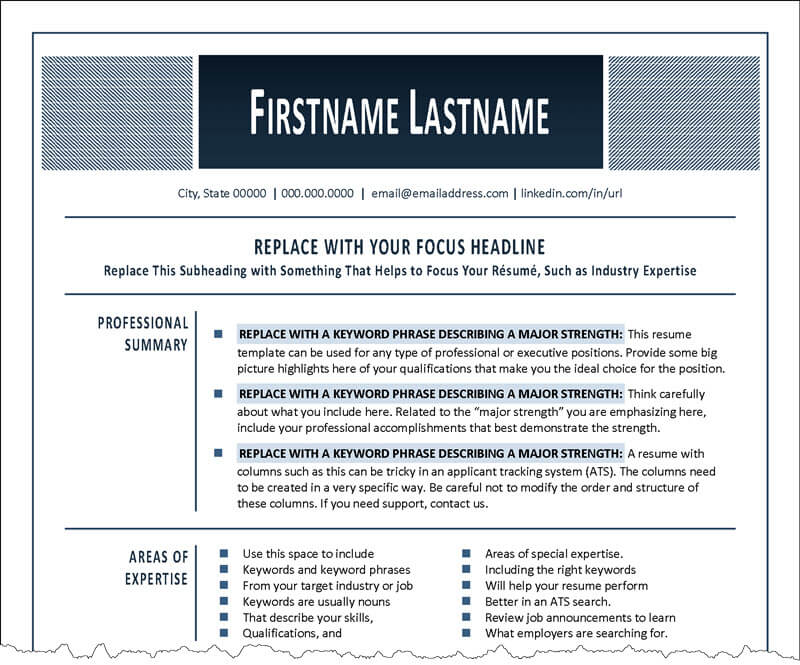
From our Structured Edge Collection, this conservative and traditional-appearing resume leverages a structured format that includes a prominent skills section (called Areas of Expertise in this template)
The Narrative Approach: Telling Your Story in the Experience Section
The experience section of your resume is your stage to shine. It allows you to tell your professional story, highlighting your achievements and how your skills contributed to them. To create a compelling narrative in this section, follow these steps:
- Start with a brief paragraph summarizing your role.
- Use bullet points to concisely convey your achievements and results.
- Begin each bullet point with an action verb to make your accomplishments stand out.
In addition to describing your roles and responsibilities, it’s crucial to back up the skills you mentioned in the resume summary with concrete work accomplishments.
This validates your claims and demonstrates how you’ve applied your skills in real-world situations. Also, remember to use industry-specific terminology throughout your work history narratives to increase the relevance of your resume to the target job.
Skills in Context: Showing How Skills Contributed to Accomplishments
Another effective technique is to use keyword phrases that highlight your skills at the beginning of each bulleted accomplishment. This method not only demonstrates your competencies in a clear and concise manner but also ensures your resume is ATS-friendly, increasing the likelihood of it being seen by a hiring manager. Here are a few examples of this technique in practice:
Example 1: Project Management
- Led Cross-Functional Teams: Spearheaded a team of 12, including developers, designers, and marketers, to launch a new product ahead of schedule, resulting in a 20% increase in quarter-over-quarter sales.
Example 2: Digital Marketing
- Implemented SEO Strategies: Enhanced website traffic 40% over six months by applying advanced search engine marketing techniques and content optimization, significantly boosting online visibility and lead generation.
Example 3: Software Development
- Developed Mobile Application: Engineered a customer service mobile app that improved customer satisfaction scores 35%. Utilized Java and Swift, integrating real-time feedback features and a user-friendly interface.
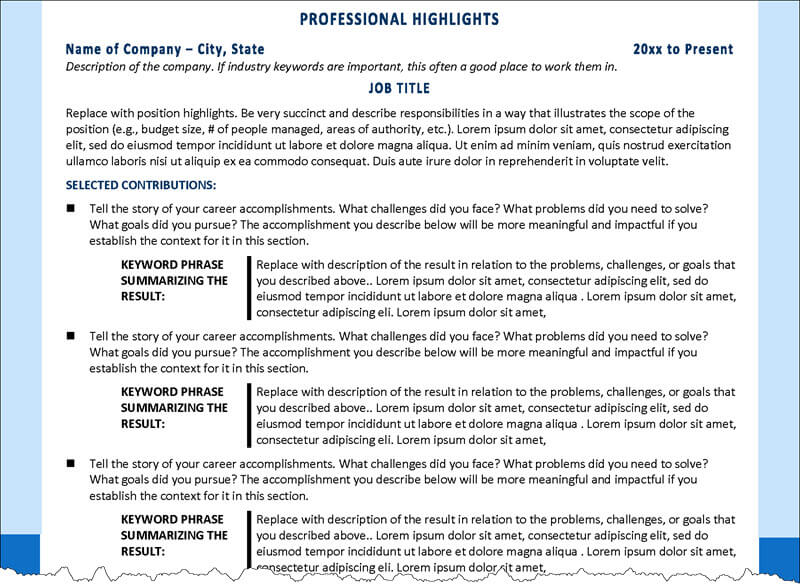
This snippet of a professional resume template leverages a modern format to allow you to work skills into the context of your experience, providing examples of your skills in action.
Starting each bullet point with a keyword related to the skills you’ve utilized accomplishes two key objectives. First, it aligns your resume with the specific requirements of the job posting, as ATS algorithms often scan for keywords related to the skills and experiences listed in the job ad. By mirroring the language of the posting, you enhance your resume’s chances of passing through ATS filters.
Second, this approach makes your resume more digestible for human readers. Recruiters and hiring managers, who often skim resumes quickly, can easily spot the relevant skills and accomplishments that make you a strong candidate. This clarity and ease of reading ensure that your key qualifications stand out, making a compelling case for your candidacy right from the start.
Learning and Adding New Skills: Continuous Professional Development
As the professional landscape continuously evolves, so should your skills. Continuous professional development is the key to staying relevant and competitive in your industry. A professional development plan includes assessing current skills and setting specific, measurable goals for acquiring new skills for your resume.
You can pursue professional development through various activities such as taking classes, reading up on new research, or engaging in on-the-job training. Remember, adopting a growth mindset is integral to professional development, ensuring continual professional skills acquisition.
Whether it’s learning a new programming skills, understanding the latest trends in digital marketing, or improving your foreign languages skills, adding new skills to your resume can significantly enhance your marketability. So, keep learning, keep growing, and don’t forget to update your resume as you acquire new skills.
The Visual Edge: Utilizing Modern Resume Templates
Initial impressions are crucial, and this holds true for the visual attractiveness of your resume as well. A well-designed resume is not only pleasing to the eye but also makes it easier for hiring managers to review and understand your qualifications. Modern resume templates offer pre-designed formats and layouts that save time and allow you to focus on the content.
Different templates cater to various industries and job levels, offering a range of options from visually striking designs to simple layouts that emphasize your qualifications. Remember, your chosen template should highlight your job search focus, relevant skills, and employment history in a structured and coherent manner. So, choose wisely and let your resume make a lasting impression.
Summary
In conclusion, crafting a well-rounded, skills-based resume is an art. It involves identifying and showcasing your hard and soft skills, learning and adding new skills, and presenting them in a visually appealing and organized manner. By employing these strategies, you can make your resume stand out, resonate with employers, and align with the expectations set by the job description. So, take the time to reflect on your skills and experiences, and remember, your resume is a dynamic document that should evolve as you grow professionally. Keep updating it, keep learning, and keep shining!
Frequently Asked Questions
What are good skills to put on a resume?
Good skills to put on a resume include both hard skills and soft skills that match what the job is looking for. Hard skills are things like being able to use certain computer programs or equipment, while soft skills are things like being good at working with others or solving problems. It’s also great to include transferable skills, which are skills you can use in many different jobs, like being good at managing your time or communicating well.
How do I list my skills on a resume?
One common way to list your skills on a resume is to create a special section called “Skills” where you can group your abilities. Start with the skills most important for the job you want. You can make bullet points to keep it neat and easy to read. For example, you can have categories like “Technical Skills” for computer abilities or “Communication Skills” for how well you talk and write. Remember to include examples of how you’ve used these skills when you can.
What are hard skills?
Hard skills are the abilities you learn through training or education that are specific to a job. These can include things like knowing how to use certain software, speaking a foreign language, typing speed, or being able to operate specific machinery. Hard skills are often taught in schools, through online courses, or on the job, and they can be easily tested or measured.
What are soft skills?
Soft skills are personal habits and traits that shape how you work on your own and with others. Unlike hard skills, soft skills are not about the knowledge you have but about how you behave and interact with others. Examples of soft skills include being a good listener, having a positive attitude, being a team player, and being able to solve problems creatively. These skills make the workplace better and help teams work more effectively.
What are transferable skills?
Transferable skills are abilities that can be used in many different jobs and industries. They are not specific to one job. For example, skills like writing well, being able to speak in public, managing time efficiently, and being good at research are valuable in many types of work. These skills are great to highlight on your resume if you’re changing careers or industries because they show you have abilities that are useful everywhere.
Do you need to include a skills section on your resume?
Yes, you should include a skills section on your resume. This section helps employers quickly see what you’re good at. It’s a way to highlight your abilities that are most relevant to the job you’re applying for. Including a skills section makes it easier for hiring managers to understand your strengths and can help your resume pass through Applicant Tracking Systems (ATS) that look for specific keywords.
What is a skills-based resume?
A skills-based resume, is often referring to a functional resume which focuses on your abilities and accomplishments rather than your work history. It can also refer to a hybrid resume that includes a strong summary section before your work experience is listed. A skills resume is organized around different skills you have developed over time. It’s especially helpful for people who are changing careers, have gaps in their employment history, or are entering the workforce for the first time. A skills-based resume allows you to show how your experiences, even if not directly job-related, have given you valuable skills that can be applied to the workplace.
How do I know what skills to put on my resume?
To figure out what skills to put on your resume, start by carefully reading the job description for the position you’re applying for. Look for specific skills and keywords the employer mentions as requirements or preferences. These can include both hard skills, like specific software knowledge, and soft skills, like teamwork or communication abilities. Match your own skills with these requirements and include the ones you possess on your resume. Also, think about the skills you’ve used in past jobs, volunteer work, or school projects that are relevant to the job you want. Choose skills that show you’re a great fit for the job and can help the company succeed.
